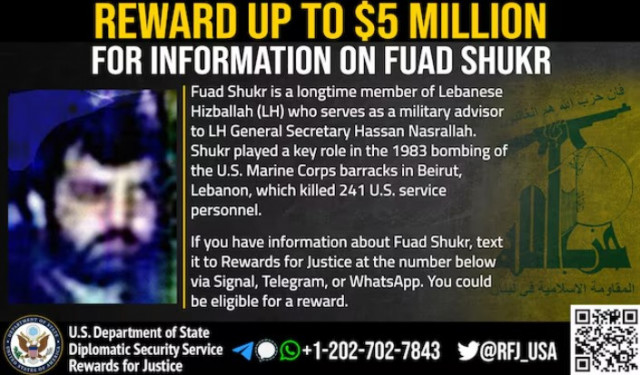Key facts about the top Hezbollah commander Israel targeted in Beirut
Shukr, a Hezbollah founder post-1982 Israel invasion, was comrade of slain leader Mughniyeh.

Fuad Shukr, a top Hezbollah commander whom Israel said it killed in an airstrike in Beirut on Tuesday, has been one of the group's leading military figures since it was established by Iran's Revolutionary Guards more than four decades ago.
Israel said Shukr, believed to be in his 60s, was Hezbollah's most senior military commander and adviser to leader Sayyed Hassan Nasrallah for planning and directing wartime operations.
Hezbollah has issued no statement on Shukr or his condition. Shortly after the strike, two security sources in Lebanon said Shukr was critically injured in the attack around Hezbollah's Shura Council in the Haret Hreik neighbourhood.
Shukr was part of the generation of Lebanese Shi'ites who founded Hezbollah following the Israeli invasion of Lebanon in 1982, and a comrade of the group's late military commander Imad Mughniyeh, who was assassinated in Damascus in 2008, Hezbollah sources said.
The United States says Shukr played a central role in the 1983 bombing of the US Marine barracks in Beirut, which killed 241 US military personnel, and had put a bounty of up to $5 million on his head, according to the US government's Rewards for Justice website.
The Israeli military said he was the commander responsible for a rocket attack that killed 12 children and teenagers in a Druze village in the Israeli-occupied Golan Heights on Saturday, as well as killing "numerous Israelis and foreign nationals over the years". Hezbollah denied any role in Saturday's attack.
Hezbollah sources said Shukr, also known as Al-Hajj Mohsin, became more prominent in Hezbollah after the assassination of Mughniyeh - a shadowy figure remembered in Hezbollah as a military mastermind who was on the US list of most wanted terrorists, accused of plotting attacks on Western interests including the Marines barracks.
Referring to those attacks and hostage-taking in Lebanon in the 1980s, Hezbollah leader Nasrallah said in a 2022 interview with an Arabic broadcaster they were carried out by small groups not linked to Hezbollah.
The Hezbollah sources said Shukr fought Israeli troops during Israel's 1982 invasion alongside both Mughniyeh and Mustafa Badreddine, another of Hezbollah's veteran commanders who was killed in Syria in 2016.
Announcing the bounty on his head in 2017, the US Rewards for Justice program said he played a key role in Hezbollah's military operations in Syria, where the group deployed fighters in support of President Bashar al-Assad in the early years of the Syrian civil war.
Hezbollah at the time dismissed the accusations against Shukr and another Hezbollah operative for whom a bounty was offered, Talal Hamiyah, saying they were "rejected and void".
The Israeli military, in a statement, said he "was responsible for the majority of Hezbollah's most advanced weaponry, including precise-guided missiles, cruise missiles, anti-ship missiles, long-range rockets", and drones.



















COMMENTS
Comments are moderated and generally will be posted if they are on-topic and not abusive.
For more information, please see our Comments FAQ